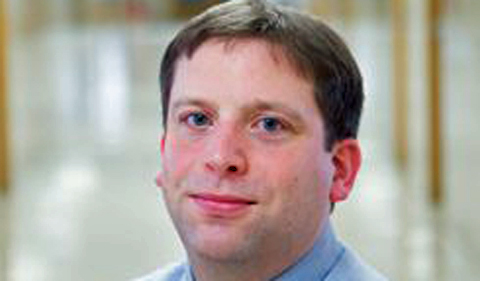
William Knoblauch
Ohio University alum Dr. William “Bill” Knoblauch enjoys creating and teaching history courses at Finlandia University and authored his first book last spring.
Knoblauch earned a Ph.D. in History in 2012 from the College of Arts & Sciences at Ohio University along with a Certificate in Contemporary History from the Contemporary History Institute.
He teaches multiple courses in modern American history and has recently released his first book, titled Nuclear Freeze in a Cold War: The Reagan Administration, Cultural Activism, and the End of the Arms Race (University of Massachusetts Press).
Here is a recent interview with Knoblauch about his research and favorite courses.
What is your current position at Finlandia and how long have you been teaching there?
Currently, I am an Assistant Professor of History at Finlandia University (Hancock, MI), but I’m going up for tenure in the spring. I’ve been teaching here about six years, and I started in 2012 after short stints teaching at University of Wisconsin – Richland and at Northland College in Ashland, WI.
What courses did you teach this semester and what are you teaching in the spring?
This semester, I taught World History to 1500, Energy and World Power, Cold War America, and America in the World since 1776. Next semester, I’m teaching World History since 1500, The History of Rock and Roll, and American Environmental History.
Do you have a favorite course that you teach, or one that you feel generates the most enthusiasm from students?
Because I’m the primary historian on campus, when I arrived I had the freedom to design my own curriculum—meaning that I enjoy just about every class that I teach! History of Rock and Roll is always fun to teach, as is America in the World. But I also enjoy teaching a variety of History through Film courses, including America in the 1980s, America in the 1990s, and Atomic Age America—a course I first proposed and taught at Ohio University. Most of my students in these classes are enthusiastic, and I’ve had some outstanding final projects both in my foreign policy course and in a class I offer called The Rise of American Capitalism.
You have recently written a book entitled “Nuclear Freeze in a Cold War.” What is the focus of the book? Which were the primary archives you consulted for your research?
The book evolved from my dissertation that I wrote under the supervision of Chester Pach. Its focus is on the role that “antinuclear cultural activism” (efforts by filmmakers, writers, musicians, etc.) played in influencing the Reagan administration to alter its Cold War rhetoric and stance in the early 1980s. Some of the primary sources I investigated were pretty traditional, such documents from the Ronald Reagan Presidential Library. Other sources included interviews with contemporaries of the 1980s celebrity scientist Carl Sagan, such as his widow Ann Druyan and his colleagues in the formation of the “nuclear winter” hypothesis, who were extremely helpful and accessible.
Do you have any ideas about what your next research topic will be?
I know, generally speaking, that my next research project will examine connections between nuclear power debates and Cold War diplomacy, although I’m already immersed in completing three ongoing publishing projects. First, alongside another CHI alumni, Christian Peterson, I’m co-editing a collection titled The Routledge History of World Peace since 1750; also, I’m completing a chapter in a teaching collection on how to teach globalization through the evolution and popularization of Jamaican music since the 1960s. Finally, I’m going to be a part of a roundtable discussing the impact of Jonathan Schell (another antinuclear cultural activists) on politics in the 1970-1980s, and anticipate that a book will evolve out of that.
You are an alumnus of the Contemporary History Institute, where you were a fellow and received a Certificate in Contemporary History along with your PhD. How do you think your experience with CHI, with its multidisciplinary approach to contemporary history, has informed your research and teaching?
I think that the Contemporary History Institute is an excellent resource for students willing to take advantage of it. It can do more than provide funding for research trips, and the CHI faculty are outstanding. Kevin Mattson’s Historiography course remains one of my favorite grad courses ever (and I took Historiography twice before: once as an undergrad, and again in my M.A. program at Northern Arizona University). Also, the multidisciplinary approach really was a good fit for my interests (in popular culture, politics, and foreign policy). When writing and teaching, I try to show the connections between these various and at times seemingly unconnected themes in contemporary history. And, I think in a political climate that is increasingly anti-intellectual and misinformed about recent events and causal relationships, the goals of the CHI remains more relevant than ever.



















Comments